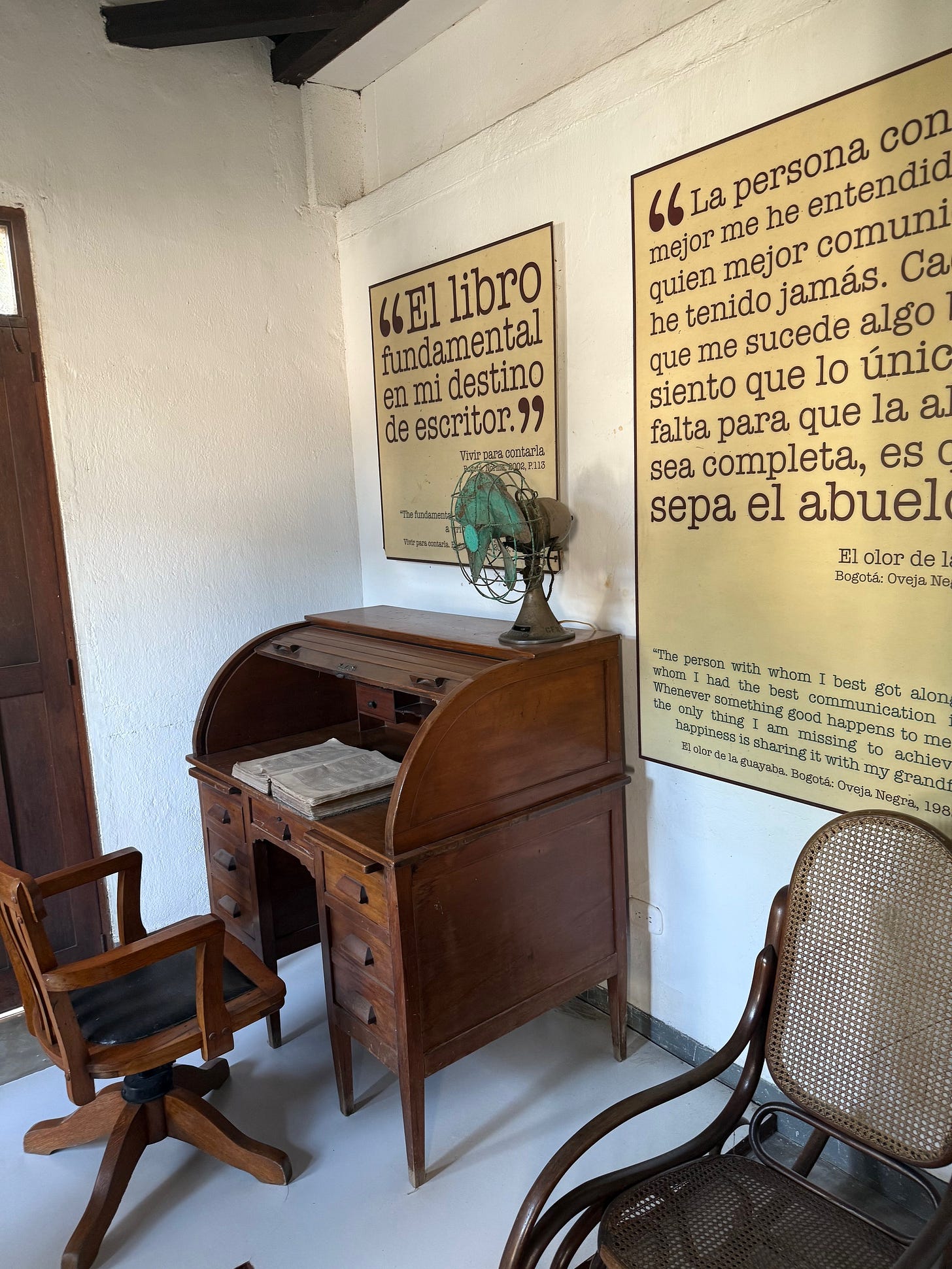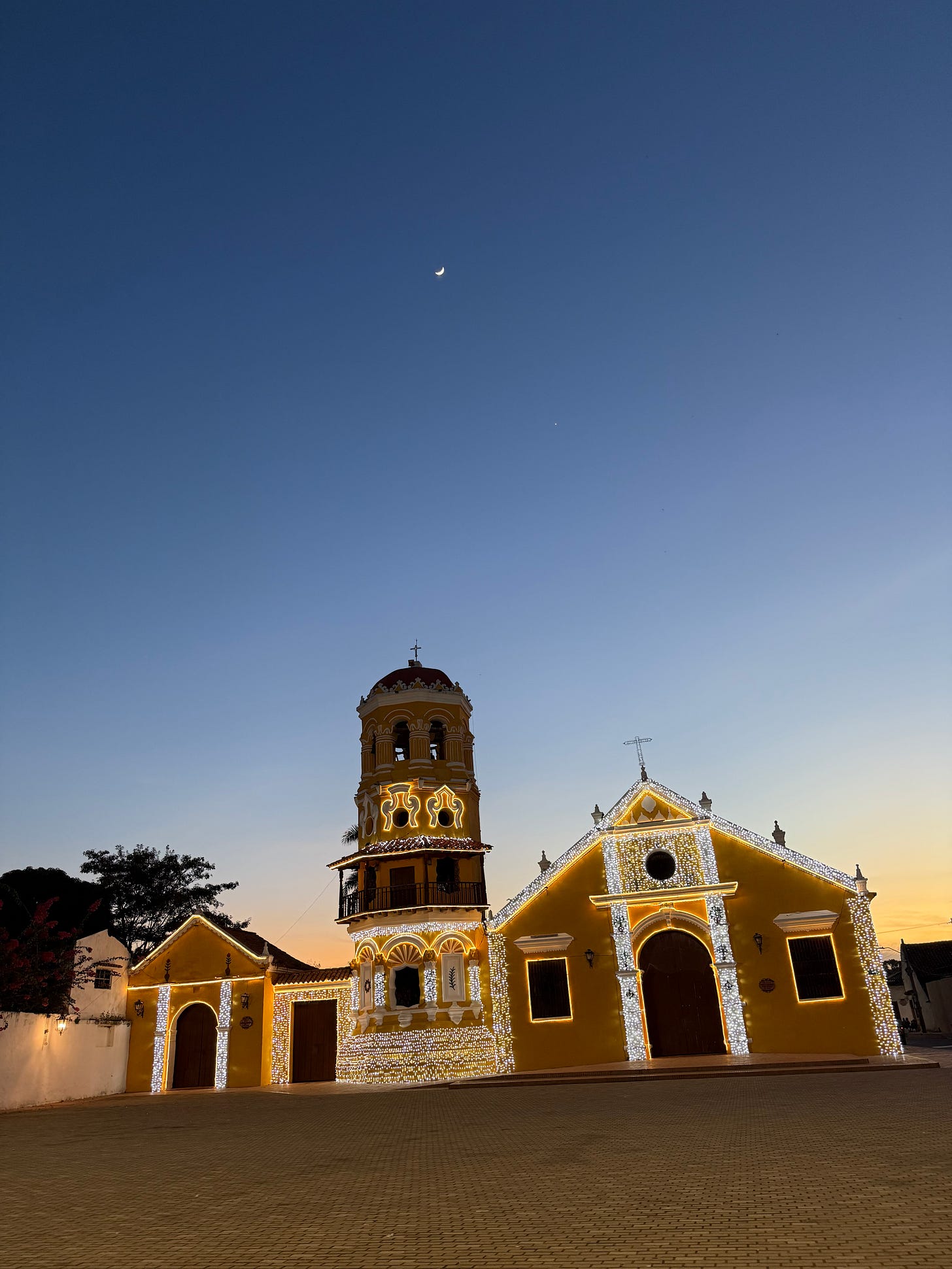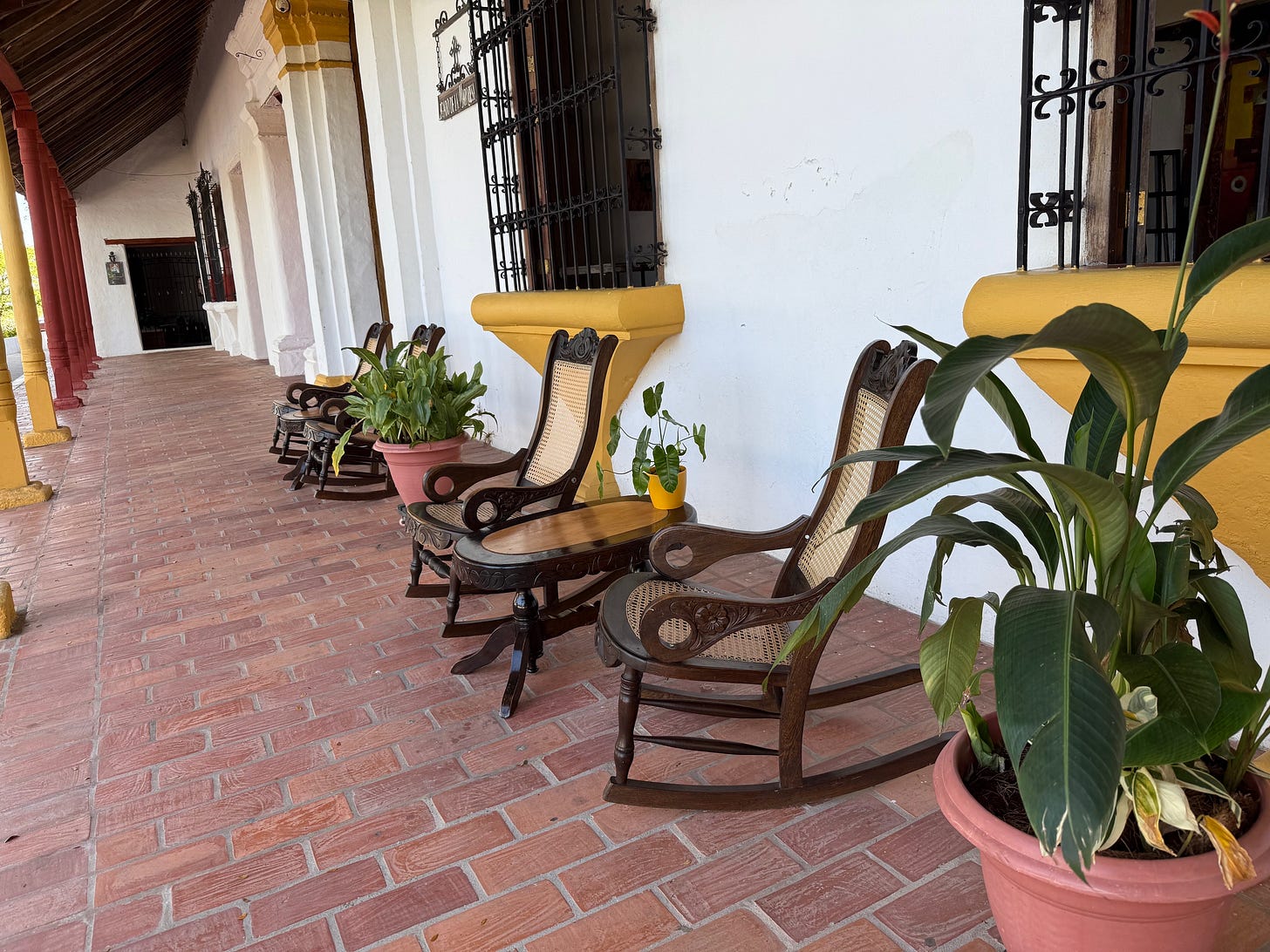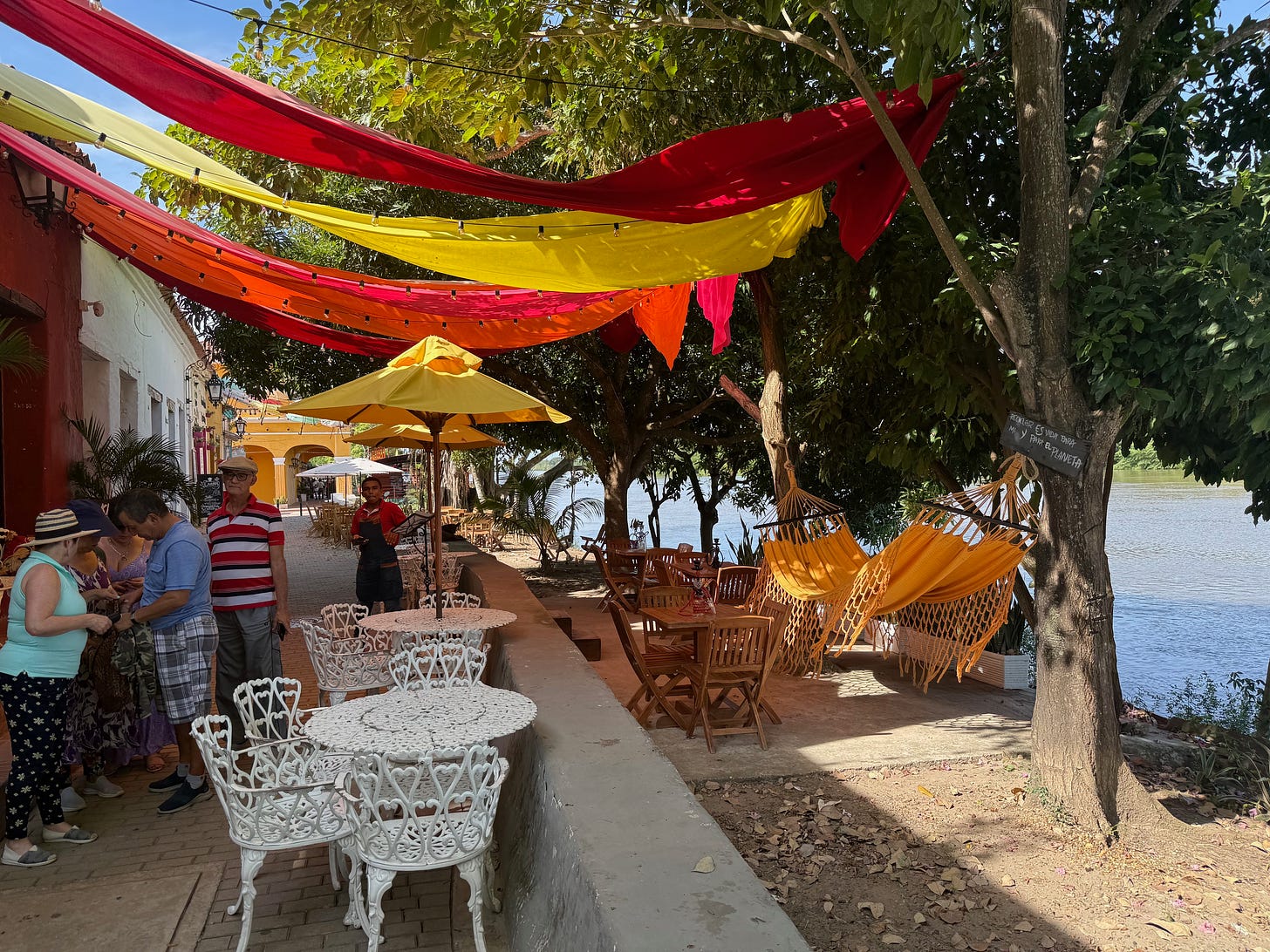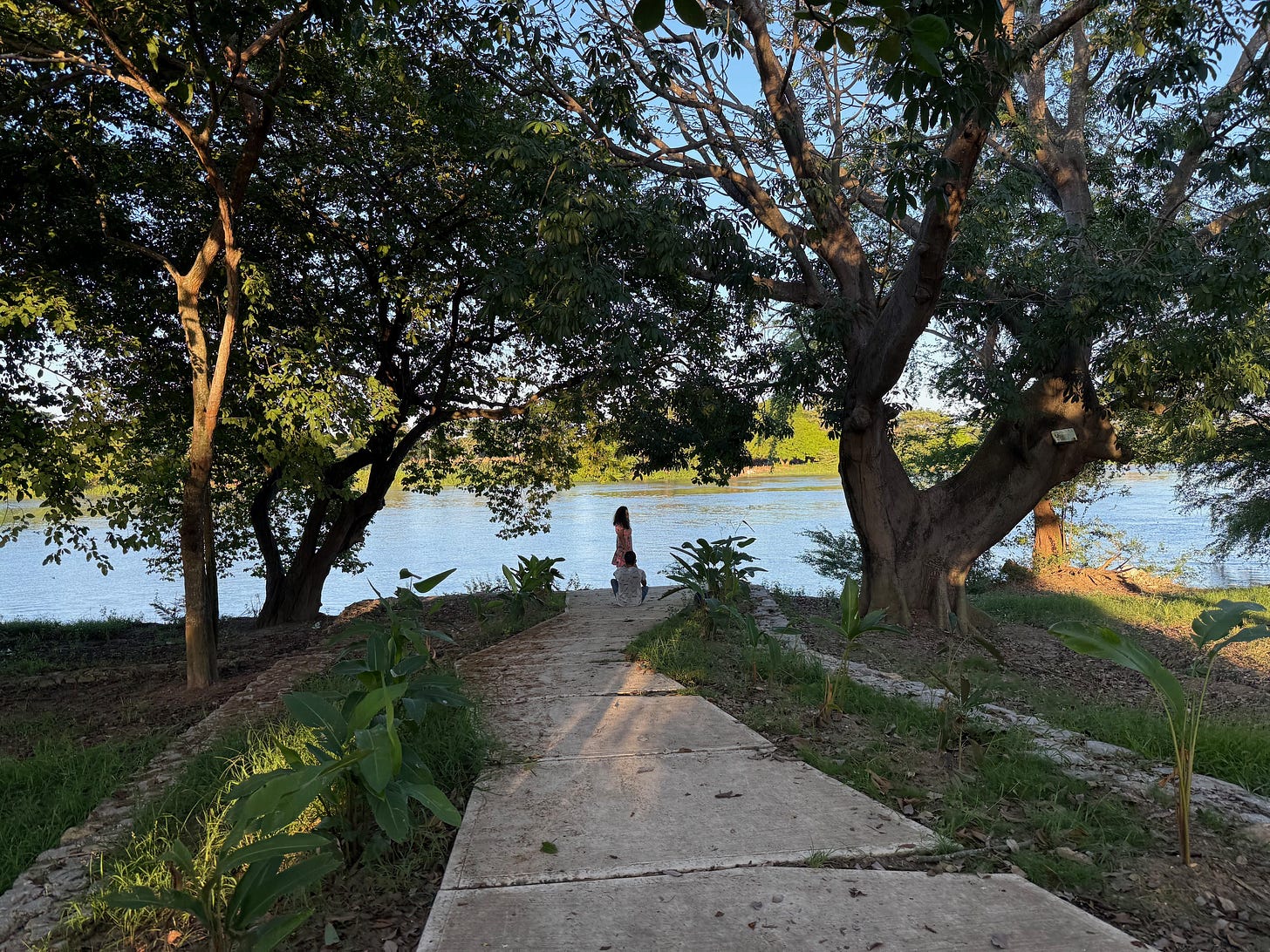Mompox: the Unreal City
I mentioned in a prior Substack that I was recently in Mompox, Colombia. Here's my full account of that extraordinary place. Plus photos
Mompox: the Birthplace of Magical Realism
The homes of famous writers are disappointing, as a rule. You see the famous desk, and that's about it. The rule is so good the exceptions stand out: e.g., Pushkin's home in St Petersburg is cool because they have the blooded waistcoat he wore during his fateful duel. Hemingway's in Cuba is intriguing because it is so macho – pistol, rifles, leather everywhere - you conclude he must have been secretly gay.
Sadly, I can report that the home of Gabriel Garcia Marquez in remote little Aracataca, in Colombia, does not break the rule. It's predictably disappointing. They don't even have the proper desk. They've got the bed where he soiled his nappy – allegedly his first childhood memory – and half a kitchen. And that's about it. A visit takes ten minutes, as does a tour of his tedious hometown.
Probably not Gabriel Garcia Marquez’s desk in Gabo’s sort-of preserved home in boring Aracataca
But if, like me and millions, you're a big fan of "Gabo", the author of One Hundred Years of Solitude – recently broadcast in an acclaimed TV version on Netflix - I have some consoling news. Four hours south of Aracataca is the town that, it is believed, inspired the magical realism of the iconic book. The town that became "Macondo". And this town, Santa Cruz de Mompox (named for an indigenous tribal chief), is one of the most enchantingly peculiar, dreamy, untouched, sensuously lovely towns I have ever visited, anywhere in the world, in several decades of travel.
At first glance, Mompox is quite simple. A handsome grid of Spanish colonial streets, alongside a grand and whispering waterway: the River Magdalena. This river was once the source of Mompox's wealth: the riverine trade was so plentiful it built all these noble churches, palaces, and warehouses.
The other source of affluence was, by way of paradox, Mompox's remoteness. In the 17th and 18th centuries, English pirates attacked Colombia's coast so successfully the prosperous gentry decamped from Cartagena and Santa Marta: heading upriver, and far inland, to Mompox. And there they remained, and yawned, and spent their cash, and slowly mouldered in the sun.
At one point Mompox was practically the capital of Colombia (or "New Granada"). The great Liberator Simón Bolívar stayed here maybe eight times. But halfway through the 19th century the river silted up, and they built actual roads, and cities in more sensible places, and thus Mompox became the backwater of backwaters: with its unique atmosphere of beautiful languor, like an exquisitely pretty young Cambridge graduate lying on a grassy green quad, her examinations finished, and nothing but summer ahead.
If you do make it here, don't expect to do much. By day Mompox mainly swings in a hammock, and sips guanabana juice and chilled Colombiana beer; at dusk people literally bring rocking chairs out into the plazas, and pavements, or down to the placid riverbank. This is not an exaggeration, this is what they do: they sit in their rocking chairs, and stare at the rippling waters. I read about this rocking chair thing before I got to Mompox – via a gruelling six-hour car journey from Cartagena - and I presumed it was hyperbole. It's not.
Despite the total lack of touristic activities – and a similar lack of big hotels, fancy restaurants, Starbucks, KFCs, major supermarkets, crime, or any sprawling suburbs – Mompox is never boring. It is delightfully, compellingly weird. On my second night here, as kids play in the main square, near the pillared riverside palace once occupied by famous naturalist Alexander von Humboldt, I see a massive owl. In the middle of a town? I become so obsessed with this I take the note "just seen a massive fucking owl", and then I get Google to translate this into Spanish (almost no one speaks English) so I can ask the concierge in my cute boutique hotel. If the owl is still present when you visit, here's the handy translation: "Hola, acabo de ver un búho fucking enorme en la plaza principal, ¿es normal?"
On my third day, which manages to be even hotter than the first two, I take a boat ride on that river. The rides are easy to find: in laid back Mompox you basically just show up by the colonnaded old market, where huge iguanas strut down the historic steps, and where they sell – if you can wake the sellers – big straw hats, sweet Momposinos wine, and ice-cold lulo juice. Then you climb in the boat – an afternoon trip is best, as the heat ebbs – and you set out, onto one of the world's epic waterways.
At first my trip is unexciting, even if the river breeze is welcome. But as we duck into backchannels, and cross torpid lakes, and thread through lilied meanders and overhanging river-woods, it gets evermore marvellous. The birdlife is fervent: ospreys, toucans, kingfishers, blue herons. With every bend, fish leap from the water in dazzles of sardiney silver. Fishermen don't have to do much to haul in fine catches, so they just stand there, knee deep, and wave at the boats. Locals get about in dug-out canoes, their children splash happily in the waters.
Eventually we turn around and head home to Mompox. I am looking forward to my supper of catfish and Colombian rice, at the water's edge (Mompox gets just enough tourists to justify maybe a dozen bars and good restaurants – that is to say: it's perfect). But then the boatman stops, and we dawdle, and I'm not sure why. Until I realize he's waiting for the sun to set, over the unreal town, and for good reason.
As the mighty sun folds its cards Mompox becomes a kind of twilit, tropical Venice, made of purples and magentas and burning umbers, and all of it reflected in the lapping waters, making one of the most movingly pretty townscapes I have seen. Then I get off the boat and head off for my fish supper. The owl is still there, hovering above the haughty iguanas.
In one of his novels Gabo Marquez has a character talk of Mompox. The character says: "Mompox does not exist, sometimes we dream of her, but she does not exist". I can attest that this is not true: wonderfully, she does exist, albeit on the shimmering, watery edge of reality.



